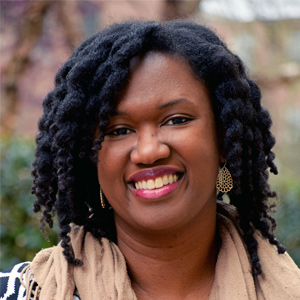
Although Black women are among those who often struggle with binge eating, research has shown they are less likely to have access to or engage with needed treatment. Assistant professor Rachel W. Goode is aiming to change that.
Goode, whose research interests focus on addressing racial, ethnic and socioeconomic disparities in obesity and eating disorders, was recently awarded a nearly $887,000 federal grant to develop a culturally relevant intervention to treat binge eating and obesity. The five-year “NIH Mentored Patient-Oriented Research Career Development Award” will also provide Goode with additional research training and mentorship. The grant is funded by the National Institute of Diabetes and Digestive and Kidney Diseases.
Goode will use the bulk of the award to develop a responsive website intervention tailored for treating binge eating and obesity, specifically among Black women. Research has shown that this population, which has the nation’s highest rates of obesity, are at a heightened risk for Type 2 diabetes or other chronic health conditions, including hypertension.
Goode’s website and intervention, which she has been developing over the last year, aims to help Black women reduce binge eating, stay on track, manage their progress, and prevent weight gain. The site includes tools to track physical activity, reminders for eating scheduled meals and healthy snacks, and other messaging to assess the participant’s relationship with food.
Perhaps most important, the site features size-inclusive images of Black women, as well as culturally competent content that aims to counter some of the triggers that may influence binge eating. The website content will also consider how factors such as poverty, trauma, racism and stress may impact behaviors, she said.
“For many, many, many years, we’ve tried to do color-blind interventions,” Goode said. “But we know that our content and any solution we have must keep in mind those realities that Black women face.”
Long-term, Goode hopes to use the project’s findings for a larger clinical study, and to improve treatment access for binge eating. Given the limited literature on Black women and binge eating and obesity, additional studies are vital to better understand current health disparities, as well as disparities in care, she said.
“I want to know the physical and financial barriers to treatment,” Goode explained. “So often, if you have an eating disorder, you can’t get help unless you go to a private specialty clinic because there are a limited number of physicians who treat eating disorders. But for many Black women who see their primary care physician for all their health needs, those specialty clinics may be a barrier. How can we ensure that people get the help they need if they never even set foot into one of those spaces?”
Moreover, Black women may also be less inclined to seek help because they do not recognize that they have a problem – a challenge partly attributable to historical stereotypes that associate binge eating and other eating disorders with white women, she added.
“Eating disorders don’t discriminate,” she said. “Fortunately, we’re learning more about them, and the good thing is we’re also recognizing that disordered eating behavior is prevalent across other racial and ethnic groups. So, there’s justification for us to do something about it.”

